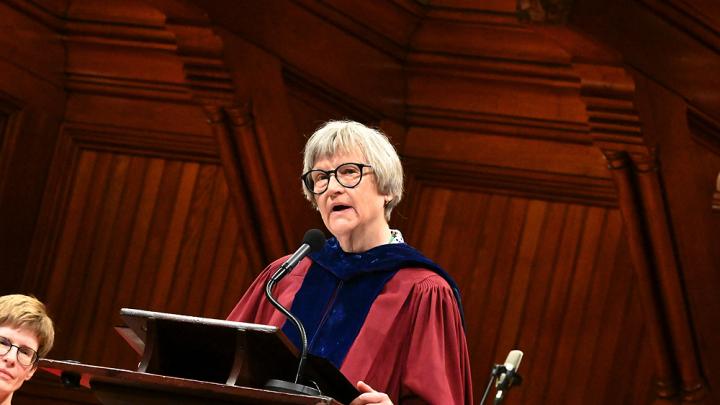“American higher education is endangered,” declared Porter University Professor and Harvard president emerita Drew Gilpin Faust during a forceful oration Tuesday morning at the 232nd Phi Beta Kappa (PBK) Literary Exercises in Sanders Theatre that was interrupted by applause and followed by a standing ovation. Reflecting on this year’s extraordinary trials for Harvard and other institutions—a recurring theme of the day—Faust said that universities “need now more than ever to be their best selves. But they also need to defend themselves against attacks that are uninformed, undeserved, or rankly partisan, attacks that are explicitly designed to weaken and marginalize a set of institutions that are foundational to American democracy and to the well-being not just of Americans but of people around the globe.”
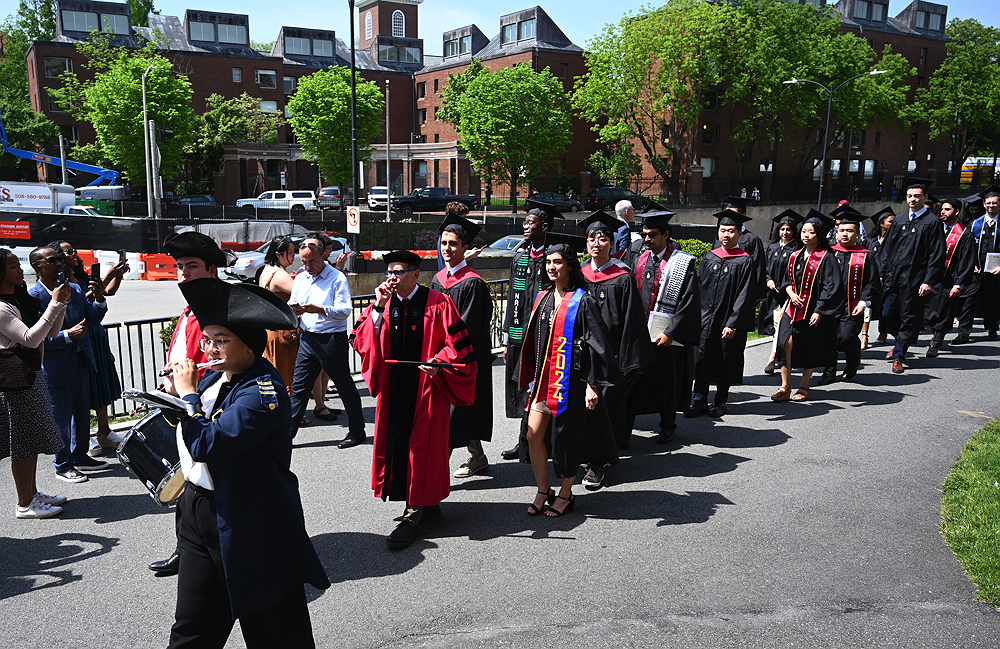
Faust’s remarks were the most fiery and explicit, but other speakers, too, reflected on a similar concerns. The ceremony was also the first to be led by Karen Thornber, Levin professor in literature and professor of East Asian languages and civilizations, who this year began her term as president of Phi Beta Kappa Alpha Iota of Massachusetts.
The Teaching Prizes
After Khalil Abdur-Rashid, an imam and the University’s Muslim chaplain, as well as a lecturer on Muslim studies, gave an invocation blessing “all in the Harvard community who facilitate the conditions suitable for the pursuit of education in liberal arts, in order to free the human spirit from the shackles of ignorance and hate,” Logan McCarty, treasurer of the PBK Alpha Iota chapter at Harvard (and assistant dean of science education and lecturer on physics and on chemistry and chemical biology), presented three honorees with Phi Beta Kappa Teaching Prizes. Nominated by the society’s undergraduate members and selected by its undergraduate marshals, they were:
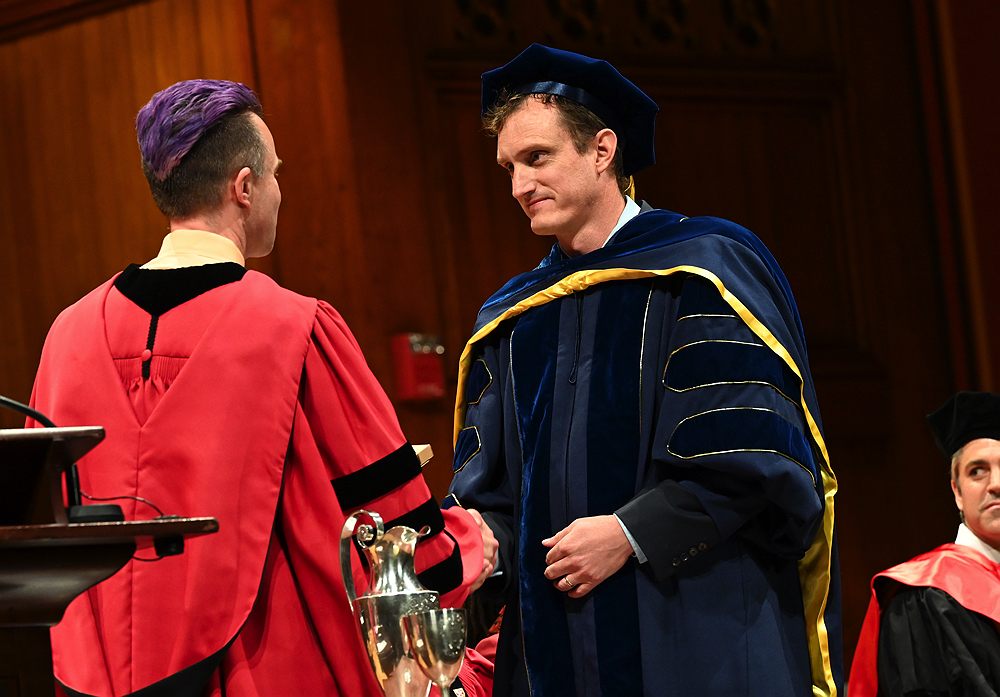
• Andrew Davies, assistant professor of organismic and evolutionary biology who, McCarty said, quoting the citation, possesses an “unparalleled dedication to undergraduate research” and supervised five senior theses this year alone. His students learn biology in the field at Harvard Forest and at research sites in Sub-Saharan Africa. Davies “inspires his students to take on seemingly insurmountable research challenges and guides them to success,” McCarty said.
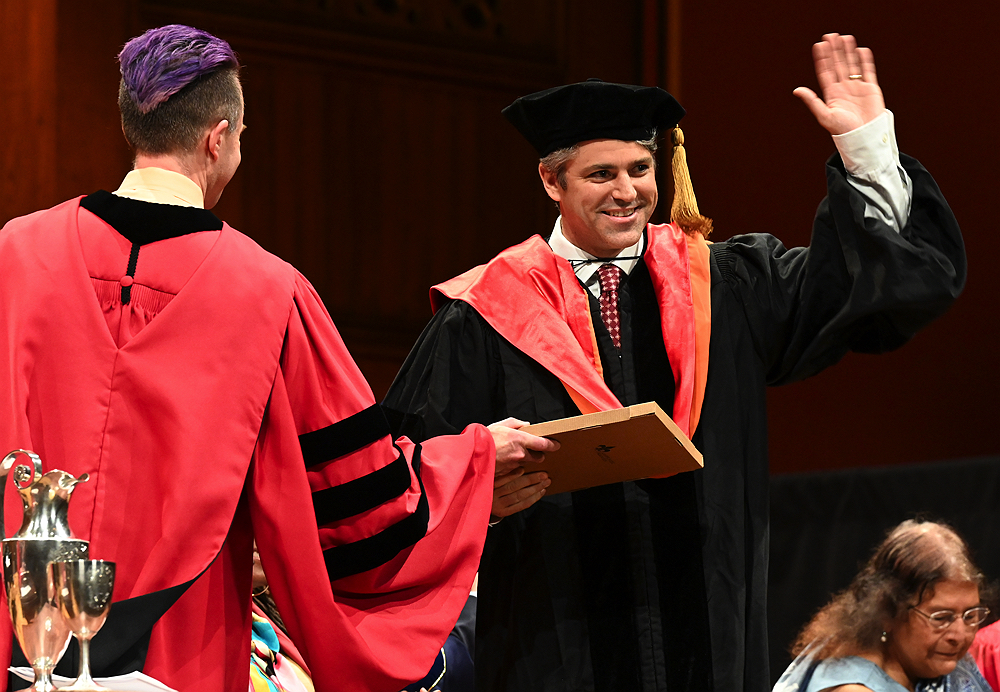
• Gage Hills, assistant professor of electrical engineering, who, McCarty reported, “teaches some of the notoriously difficult courses in electrical engineering and makes them accessible, engaging, and inclusive,” with carefully crafted lecture slides and simulations that give students a “visual depiction of how all the pieces fit together.” Hills, McCarty said, “meets students where they are at their level of understanding, and sends a clear message that every student, regardless of their background, has a place within electrical engineering.”
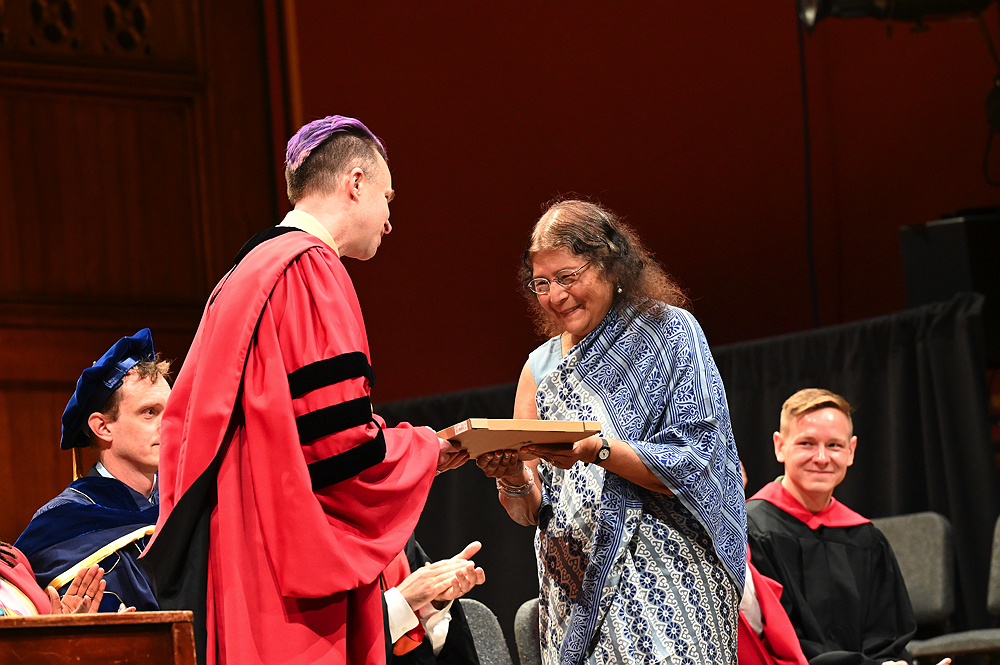
• Sheila Jasanoff, Pforzheimer professor of science and technology studies at the Harvard Kennedy School, a pioneer in her field, McCarty said, whose courses attract students from the natural sciences, engineering, social sciences, and humanities. Winner of a Holberg Prize, “often called the Nobel of the humanities,” McCarty said, she fosters in her teaching “conversations among people with very different backgrounds and creates interdisciplinary intellectual communities that are a gift to every student.”
The Poet: “History is Heavy”
Tracy K. Smith ’94, professor of English and of African and African American studies, is one of the nation’s most celebrated poets. The 22nd Poet Laureate of the United States, whose 2011 book, Life on Mars, won the Pulitzer Prize, and whose poetry often plumbs issues of history, memory, and African American experience, Smith explores “what it means to be human in an ever-changing world,” as Ali Asani said in his introduction to her reading. And indeed, two of the songs that students in the Commencement Choir performed were musical settings of excerpts from Smith’s 10-poem sequence, “I Will Tell You the Truth About This, I Will Tell You All About It,” which appears in her 2018 book, Wade in the Water. The words in those poems, Smith explained later, were drawn from archival letters and deposition statements from black veterans of the Civil War and their families. “Mr president,” reads one poem the choir sang, titled “We Are Free,” “It is my Desire to be free / to go see my people / on the eastern shore / my mistress won’t let me / you will please / let me know if we are free / and what i can do.”
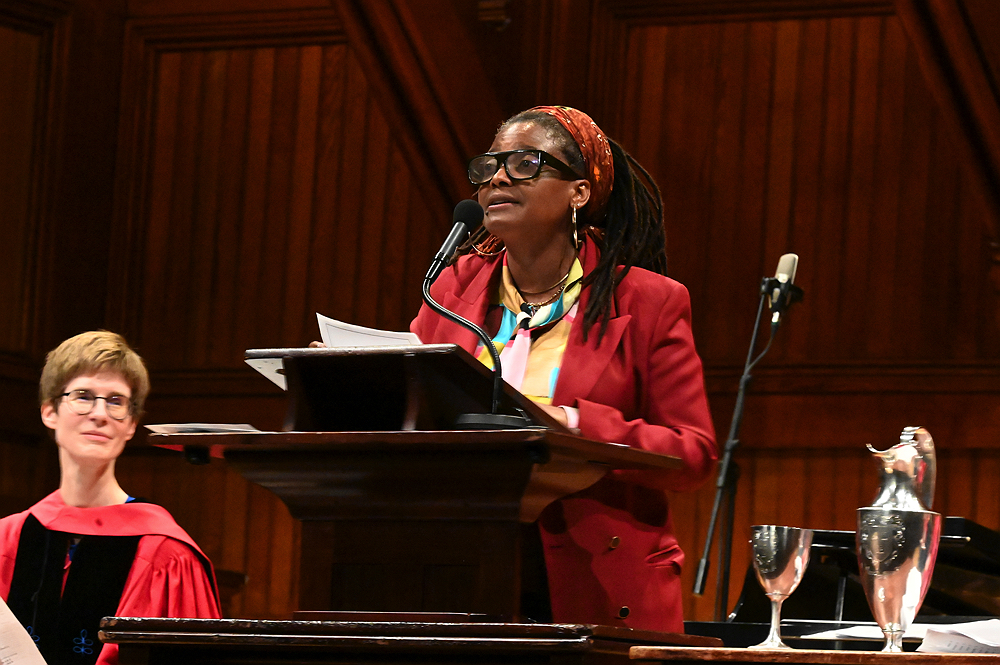
In his introduction for Smith, Asani, Albertson professor of Middle Eastern studies and professor of Indo-Muslim and Islamic religion and cultures, (and co-chair of Harvard’s task force on combating anti-Muslim and anti-Arab bias), said that she “argues that the soul is not just a site for attaining personal transcendence, but it is also a tool for fulfilling our responsibilities to each other and engaging with pressing societal issues, such as: Who are we as a nation? Where have we been? Where are we going?”
In her own remarks, Smith noted how poetry has helped her “race toward some of the farther reaches of the human experience,” many of which “are fearsome.” She shared two poems that she said had arisen from “this year that we’ve endured together” as a Harvard community. She recalled feeling “a great deal of fear” this past winter—for the University, for colleagues and friends here and elsewhere, and for herself as well: “my neck, my skin, what would happen to me, who is coming to take something away from me that I prize or believe that I need.” Meditation helped her shift out of “that self-centered space,” she said, and produce a poem called “Vision,” published last month in The New Yorker. Moving back and forth across history and geography, it traces the dark edges our past and present moment. “History is heavy,” Smith said afterward. “But it’s always with us.”
The second poem she read was written specifically for the occasion. Titled “Fly By,” it gathered together events that marked this past school year—many difficult, but others “marvelous”—and set them against cosmic occurrences: a comet, a constellation, the recent unusual nearness of the Northern Lights. In a section titled, “Eclipse,” Smith wrote: “There is but one star / all chase, obey. / We watched it / Shaved down and / sprout back.” The next stanza reads: “That same day, / wars raged. / Dialects of harm. / Unseasonable / warm.”
The Orator: “The Rule of Truth”
In her remarks, Drew Faust took sharp aim at the critics of higher education—especially politicians—whose decades-long onslaught, she noted, has accelerated dramatically in recent years. The attack, she said, “is deliberate and it is determined, and it is now enlisting many whom we had come to think of as staunch allies.” She continued:
The upheavals of this past academic year arising from the tragic situation in the Middle East have provided the occasion for those already hostile to the culture of American higher education to escalate their criticisms. The polarizations of race, religion, and politics that grip our country have in recent months focused unceasingly on universities. One might even suggest that universities have become a primary symbol for these larger divisions, as well as the theatre in which they are being acted out. But this is not just theatre; it represents a genuine and existential threat to the foundational assumptions that have long governed American higher education.
Noting that higher education is sometimes described as “our country’s most successful ‘industry,’” she laid out its broad and longstanding contributions to collective and individual prosperity: health, happiness, wealth, scientific and societal progress. “At this moment, we are sitting in the center of the biotech capital of the world,” she said. “It is here because universities are here. Why are people working so hard to denigrate them?”
Again and again, she laid this denigration squarely at the feet of Republicans. Observing the dramatic dropoff since 2015 in public faith in higher education, she noted that it has occurred “overwhelmingly among Republicans”: in 2023, only 19 percent of Republicans reported having high confidence in colleges and universities. Faust sounded the alarm about partisan politicians meddling in universities’ curriculums and governance. She deplored a new law in Indiana mandating that professors teach a “variety of political or ideological frameworks.” Faust asked, “Does that mean a biology professor must teach creationism? Or a historian offer a portrait of our past that erases terrible injustices like slavery in service of painting an unrelievedly celebratory notion of the American experience?…To mandate what is often hailed as ‘viewpoint diversity’ can mean presenting material that is just plain wrong. Does a politician know more about biology than a biologist? About history than a historian?” Faust also condemned the state of Florida’s takeover of New College, a small liberal arts institution, where Gov. Ron DeSantis, J.D. ’05, and his legislative allies installed an explicitly conservative board of trustees and chased out 40 percent of the faculty.
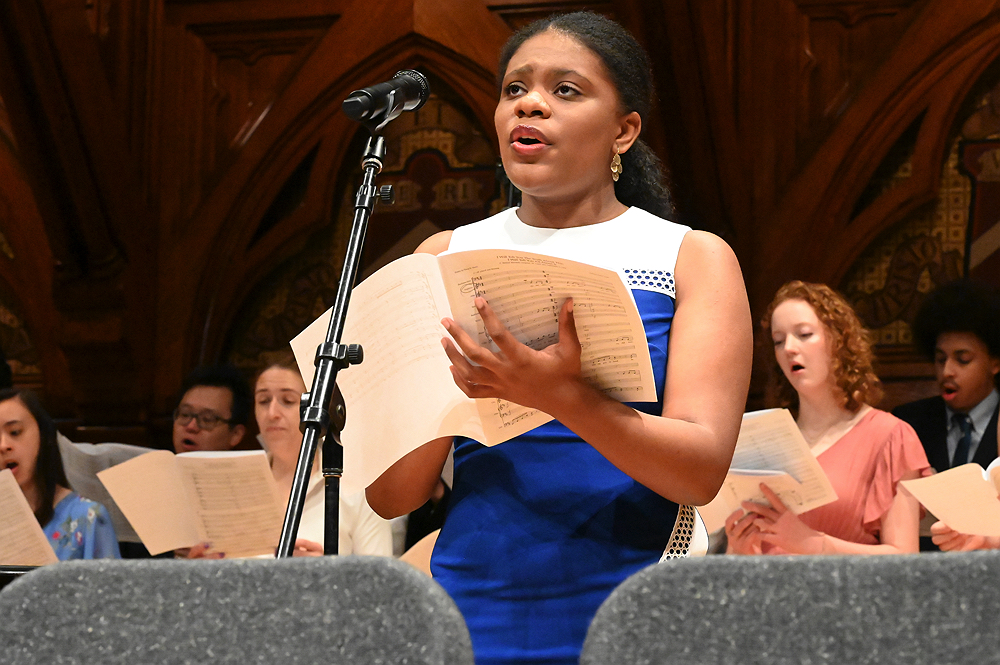
She also rebuked U.S. Representative Elise Stefanik ’06 (R-N.Y.), though without naming her explicitly. Stefanik has become one of the fiercest critics of Harvard and other institutions, and during last fall’s Congressional hearings on antisemitism on college campuses, she aggressively grilled former president Claudine Gay; after Gay resigned, Stefanik claimed victory on social media. In her remarks on Tuesday, Faust said, “We should not be permitting, and certainly not celebrating, a governor or a legislature or a member of Congress who is designing courses or degree requirements, hiring faculty, or proudly claiming responsibility for firing university presidents.” The audience erupted into applause.
Faust addressed a number of the complaints that Americans have about universities, including high tuition costs (precipitated in part by public defunding of universities, she noted) and the perceived liberal slant of faculty and administrators. “Statistics about political allegiances of faculty indicate that there are five Democratic professors for every Republican,” Faust allowed. But she urged universities to push back on partisan labels, in part by doing better and repairing past failings: “Universities must resist being portrayed in this partisan light by reinforcing their support for the ideals of free speech and by continually strengthening their dedication to the open exploration of ideas,” she said. “Just as judges are expected to transcend political leanings in their loyalty to the rule of law, so the culture of a university requires loyalty to what we might call the rule of truth.”
She continued:
The essence of a university requires it to stand above the political fray, to uphold the value of rational argument and exchange as the pathway to finding and refining the best ideas. This does not mean that its students and faculty cannot have their own political loyalties. But these must not silence or marginalize other perspectives or undermine the principles of academic freedom and rigor in the classroom or in research. We in higher ed have been far from perfect in this regard.…I know from you and your classmates that you have sometimes found it challenging to express disagreement with what seemed to you prevailing views in classrooms or in dining halls. In recent months deeply felt divisions over a raging war have made maintaining a dedication to communicating across differences especially difficult. But I also know how so many of you have remained committed to rational and dispassionate exchange as you have listened to one another and reached for understanding.
She ended with an exhortation, echoing Ralph Waldo Emerson’s famous “American Scholar” oration and an earlier one given in 1809: “We who have been nurtured and shaped by universities, we who proudly embrace our identities as scholars ‘free and brave,’ must acknowledge, to borrow from that early PBK oration, both the ‘dangers’ and the ‘duties’ that lie ahead.”
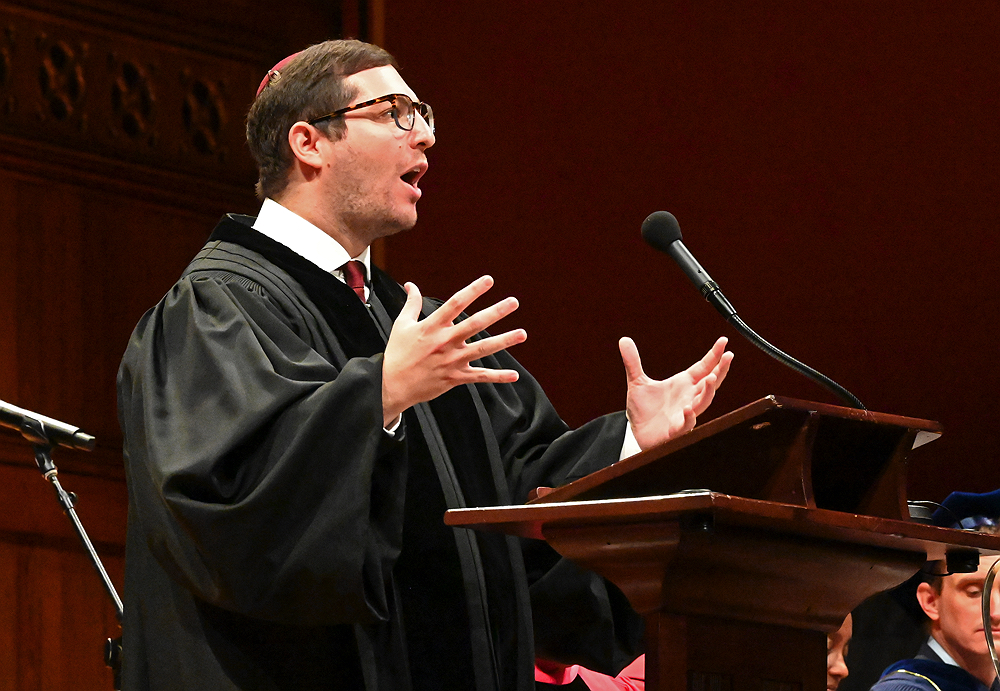
Then, after the singing of “Fair Harvard,” Noah Marlowe, Orthodox rabbi at Harvard Hillel, delivered the benediction, meditating on the meaning of Psalm 8 and the quotation “What is man, that thou art mindful of him?” which is etched at the entrance of Emerson Hall. “My dear students,” Marlowe said, “it is this dialectical, of smallness and greatness, of majesty and humility, that is meant to guide us after our lives at Harvard.…My wish for all of you is that the gifts and blessing that you acquired at Harvard will guide you and endow the world and all of humanity with brilliance.”
